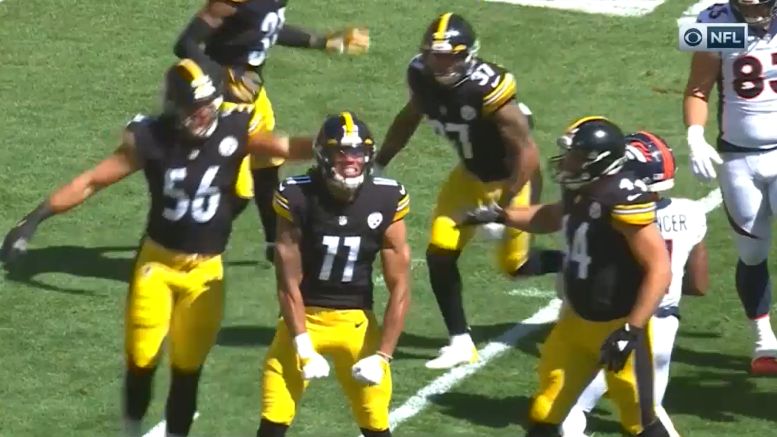One thing is for certain with Pittsburgh Steelers’ wide receiver Chase Claypool: he wears his emotions on his sleeve.
Whether that’s on or off the field, Claypool’s emotions are very visible. He’s easy to read. That can be both a blessing and a curse in professional sports though, and Claypool, who enters his third season with the Steelers, knows he needs to better channel those emotions on the field to avoid hurting his team and teammates.
Appearing on the Varsity House Podcast Wednesday with host Shaun Crawford, a former teammate at Notre Dame, Claypool discussed his emotions as a player while joined by teammates Myles Boykin and Minkah Fitzpatrick.
“I think you’re right in the sense where it’s like, you know, you do have to tone it down at times, cuz last year there was a couple times I let my emotions get the best of me with some unsportsmanlike [penalties],” Claypool said to Crawford, according to video via the Varsity House Podcast’s YouTube page. “…I’m emotional player. I gotta channel it, channel it the right way. Usually I do it. I do it throughout the game, like to my benefit, but I just gotta make sure I don’t let that slip.”
Claypool has let it slip at times in the past, drawing some silly unsportsmanlike penalties for jawing at another player or showboating overall. There’s also been times where he’s gotten caught up in the moment of making a play that he’s forgotten the actual moment of the game, which has cost his team. You can harken back to the Minnesota Vikings’ game this past season for that example, leading to a blowup at teammate Trai Turner, who tried to take the football off of Claypool to get it set for the spike.
Still, with some of the bad that comes with the emotion, there’s often good, too. Claypool doesn’t need any extra motivation to get up for games, as he already has a passion for it and wants to be great. That energy can be infectious, and it’s spread to some of his fellow wide receivers in the past, leading to passionate, competitive play for the Steelers at times.
Having a guy like Claypool on the team, especially on offense, can be a much-needed boost for a young group overall. When one guy is ready to go right from the jump and wears his heart on his sleeve, there’s see that and tend to adopt that mindset.
New Steelers’ wide receiver and former Notre Dame teammate Myles Boykin certainly sees that, and stated to Crawford that in all his years with Claypool, he’s always been an emotional player but it’s never been in a selfish way.
“I’ll say this man, since I’ve known you, yeah, you’ve been an emotional player, but not one time I’ve ever thought like this person doesn’t care about the game,” Boykin said, according to video via the Varsity House Podcast’s YouTube page. “So I think some people get that twisted in terms of when they look at an emotional player, like, ‘oh, he doesn’t care about his teammates. He doesn’t care about his team.’
“I’ve never, ever felt that way about you as a teammate, bro,” Boykin added, speaking to Claypool. “Going into war, you one of the first people I want to pick, cause I know you gonna do everything you can to win the game.”
That’s the general consensus regarding Claypool when it comes to thoughts from teammates past and present regarding his emotions on the field. While it can get out of hand at times, it’s not with bad intent. Sometimes that comes with a young player finding his way in the NFL, but credit must be given to Claypool, as he certainly seems like he understands what’s being asked of him and is mature enough at this point to realize he needs to make some changes overall, not only for the betterment of the team, but for himself as a player.
“I think I just care so much about he outcome of the game that sometimes I like that get the best of me, but I’ll never look at that and look myself in mirror and like, I gotta care less,” Claypool added. “I’ll never do that.”
When Steelers’ head coach Mike Tomlin talks about “rather saying whoa! than sic ’em!” he’s talking about players like Claypool. You can’t coach emotion, hunger desire to be great. What you can teach is how to channel those emotions, hungers and desires into the right places, unlocking the player’s true potential in the process.
That’s the next step for for Claypool.








